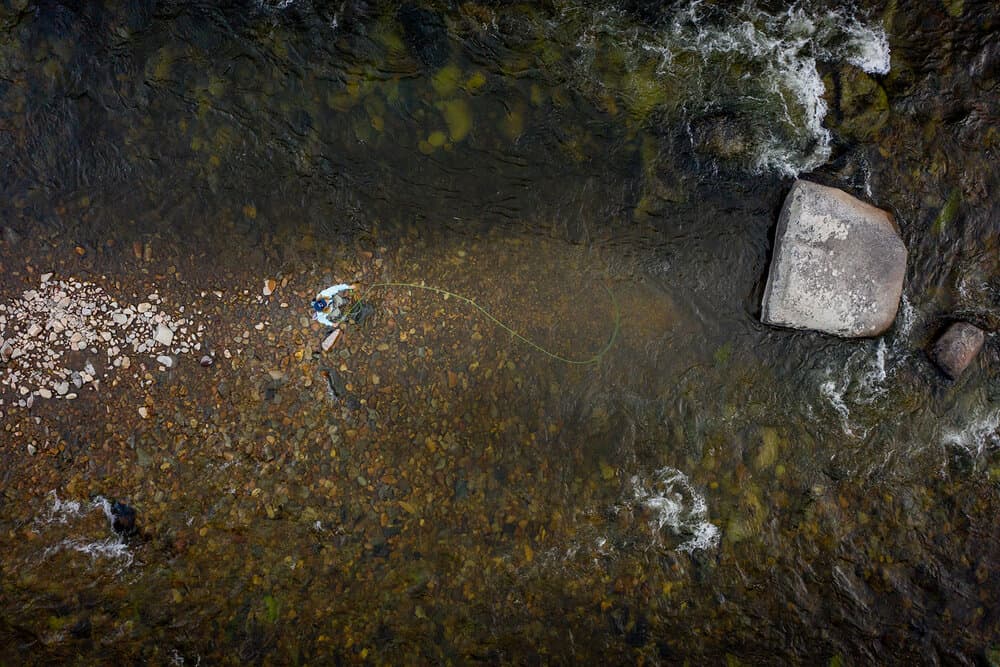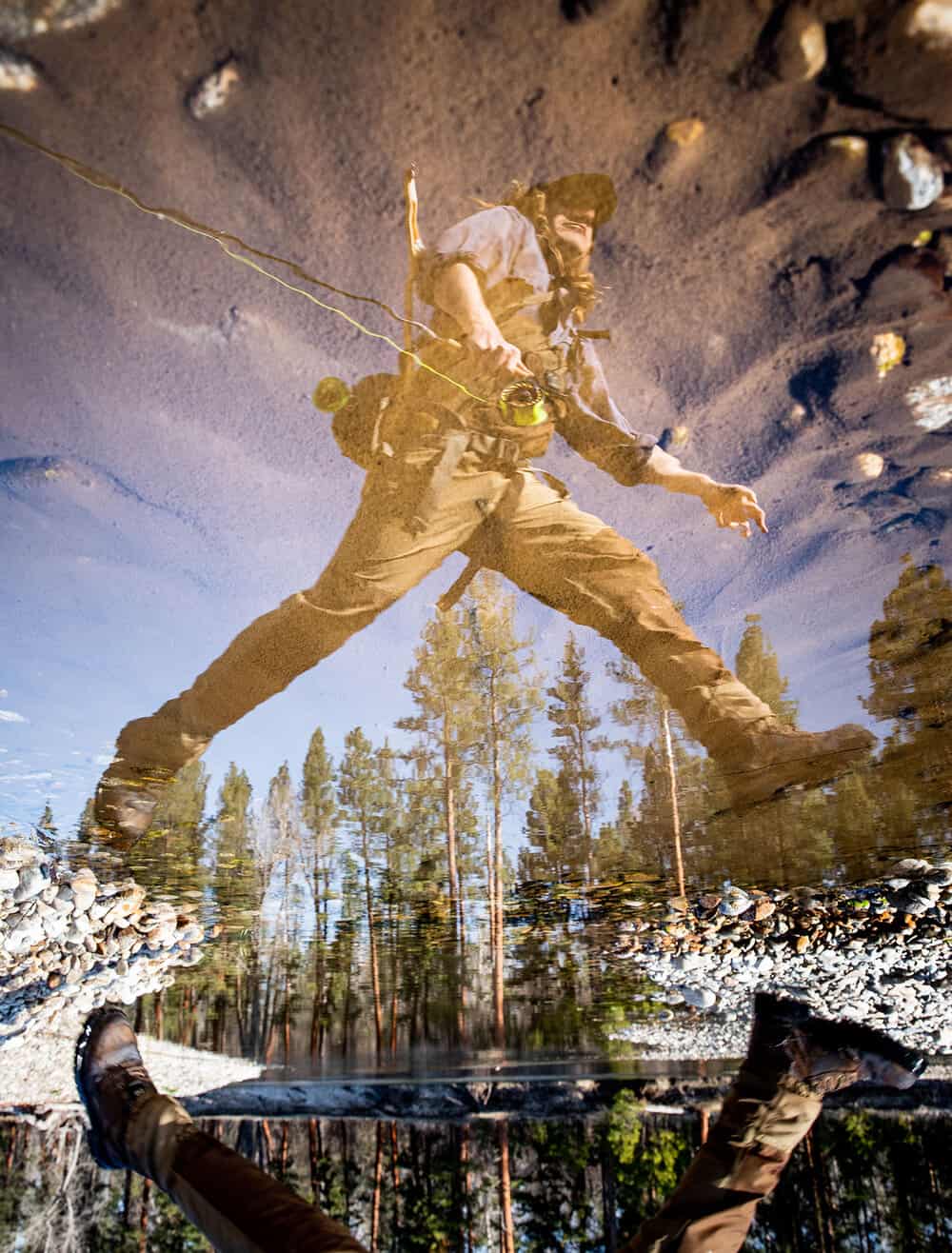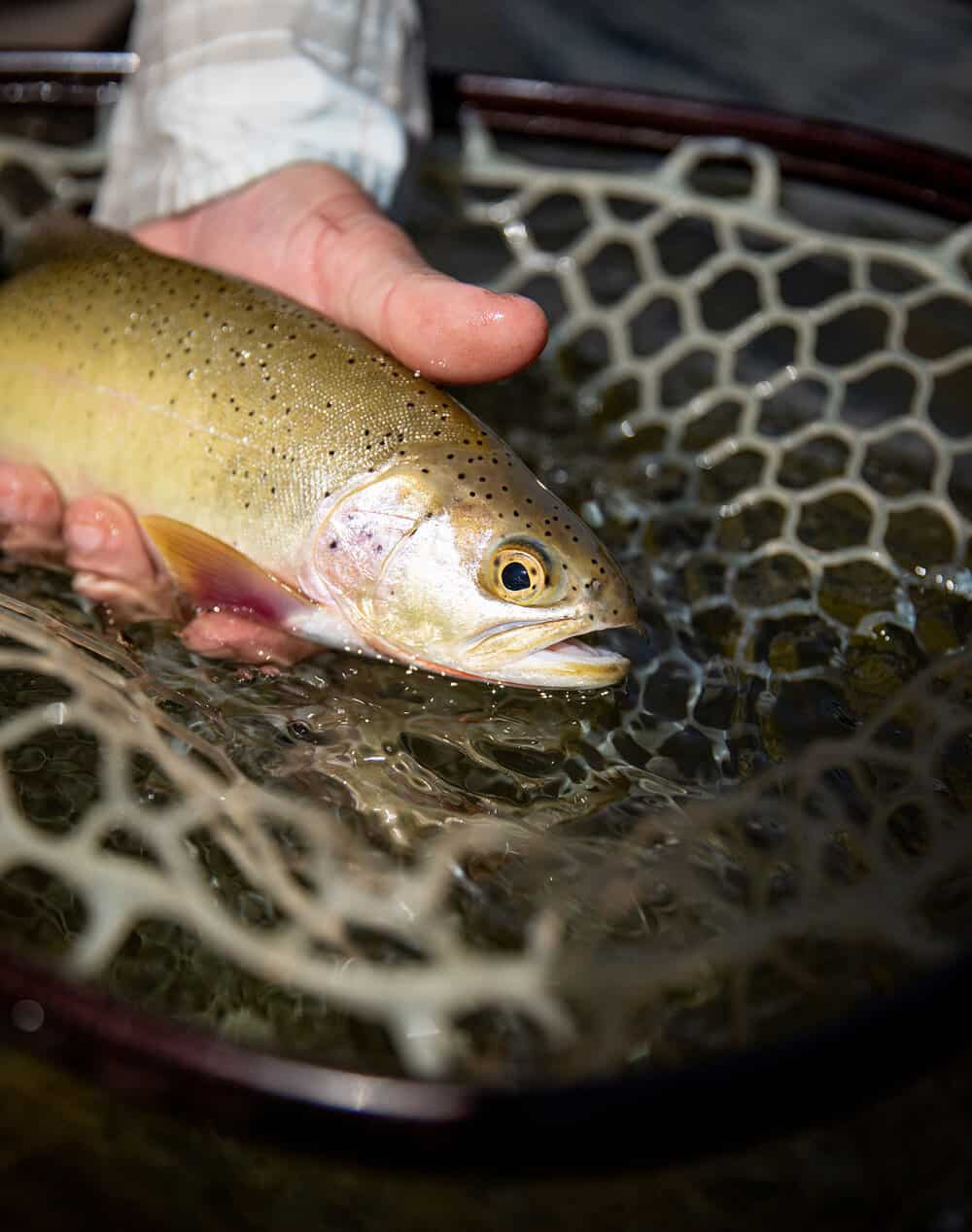Your cart is empty
STORY BY Rob G. Green
MISSOULA | MONTANA
In the way he loads his fishing pack into the trunk of his ‘03 Volkswagen, you can tell Nick Maya’s mind is running. He fidgets with the buckles and curses at the holes in his old waders that he knows will let water in. His eyes dart around the car for anything he missed as he shuts the door, pausing to glance up at the jagged teeth of the Bitterroot Range. He exhales.
“My dad got it,” he says, checking his phone’s fading reception through a Ziploc bag. “Found out a couple of days ago.”
No need for formalities at this point. Saying “Coronavirus” or “COVID-19” seems like a waste of breath. I’m guessing this is why Nick wanted to get out of the city for a bit, which doesn’t take long in a place like Missoula.
I’ve been following the way Nick has been negotiating this pandemic for a couple of months now, curious about the ways in which we’re all coping with the stress of “it.” Fly fishing is his. A recent transplant to Montana raised on both coasts, he’s found his calling doing habitat restoration projects for the local Center for Large Landscape Conservation while wrapping up a master’s degree at the University of Montana. He’s often talking about the pressure from a paper that needs to get written or a work deadline that’s coming up faster than he’d like. He fidgets. He stutters when he gets excited or nervous.
With his dad across the country in New York, it’s hard to blame Nick for feeling wound up. He is a young man in a pandemic: his work has been disrupted, his education got spun around, and his financial footing is shaky.
At the riverside he lingers, staring at his phone’s “No Service” signal one last time, then stuffs it into his pack. He snatches up his rod and starts walking toward the water. As someone whose parents are equally susceptible to the virus, I can imagine the places Nick’s mind is going. The thought of burying the person who taught you to ride a bike or hammer a nail, who coached you through your first breakup, suddenly feels closer and realer than it should.

But as he steps into the river and starts sending out line, a change comes over him. As disorienting as his world has become, for at least this one moment, Nick is unshakably focused. Since the outbreak, I’ve watched people use any number of strategies to rationalize the level of confusion a single year can bring. Some focus on religion, some on anger, some on an ever-dwindling liquor stash. Some just focus on acting like nothing is happening at all. Nick hones in on that back-forth-back-forth motion of the rod, unfurling line out into the river. The fly drifts and slows in the current, and for the first time all day, I watch Nick’s pace slow right along with it.
Within the angling community, some claim that just stepping into a river sets their soul straight. Those who paint this romantic scene in their minds — all untrammeled and picturesque like the Disney version of a Norman Maclean novel— might not want to admit how much time they spend being frustrated. The line tangles up in the wind. The hook skewers your finger. The fly snags on submerged debris. The “goddamn fish won’t eat.” Some of the most creative expletive use I’ve ever heard has come from anglers’ mouths, and to that end Nick is no exception.
The simple reason Nick slows down out here is because he has to. After all, it’s hard to move quickly with his line stuck in a willow after a lazy backcast sent him scrambling up the bank to salvage a couple of flies that cost him $1.50 a piece.
Without something like this to slow him down, it’s easy to see how all his individual frustrations could turn into major fault lines. Aside from managing ADHD, aside from trying to figure out Zoom classes, aside from trying to keep a stable paycheck, and aside from not knowing whether his dad’s health will improve or deteriorate, he’s trying to catch fish that refuse to eat the hopper pattern I promised him would work when we headed out this morning.
His waders are filling with cold water as upriver wind gusts complicate his cast, and despite the frustration and discomfort that I know he’s feeling, Nick’s eyes are set only on reading the water. Back-forth-back-forth. Load and release. Strip the line. Start again.
Still, what Nick is doing out here is so often perceived as escapism. American life is snarled up into a knot I haven’t seen before. Pull on one thing and everything else gets tighter. People seem more on edge. Actions seem more consequential. Full and constant participation in nearly any current social movement is seen as more than just important, it’s seen as expectation by allies and adversaries alike. Stillness is considered apathy at best, complicity at worst. Surely standing in a stream does nothing to stem pandemics or dismantle racist institutions.
Nick is, after all, an able-bodied white guy standing in a stream casting a fly line like so many who have come before. That’s not lost on him. For as much as he loves standing in this river, he understands the privilege that allows him to stand here in the first place, so he tries to do something with it. In addition to everything else he’s working on and through, he serves on the National Park Conservation Association’s Next Generation Advisory Council, with the explicit goal of ushering in a more diverse generation of outdoor leaders. Much of this work involves advocating for equitable access to national parks and fostering relationships with communities and cultures that have historical connections to the places we now call parks. Like his cast, his efforts are imperfect, but that’s not the point. The fact that he keeps throwing line is a testament to his willingness to improve.
Escapism isn’t what’s happening here. As motionless as he’s been in the river for the past ten minutes, I know the frustration is changing him. He’s starting to question my advice. He’s watching the caddis hatch flying close to a calm eddy on the inside of a current. He’s noticing whether or not his shadow is cast over a deep pool where trout would be. He adjusts. He changes flies, he changes positions, he resets. To simply equate stillness with inactivity would be to undermine the clarity that it brings.
Of course, anyone who has spent time in a river could tell you that all these adjustments don’t actually mean you’re going to get it right. You’re just going to get it more right, more often. Even on the days you do everything as perfectly as you could have possibly imagined, there’s still no guarantee you’ll land a fish.

This is what some people call patience. It is not inactivity, nor is it apathy. It is the presence of mind to endure present frustrations, look deeply at what surrounding factors can catalyze desired results, and then begin to act on those observations. Sometimes it’s obvious, sometimes it’s not, but there are many ways for a person to practice this genuinely — with or without a fly rod. In my time with Nick, something tells me he’s the sort of person who reaps the benefits from this stillness and sows them in other corners of his life.
Then the line tightens.
The rod tips back and the reel spins. He positions himself toward the thrashing fish and plants his feet against the submerged rocks. Sometimes taking line and sometimes giving it, he works the fish until it’s lying in his net.
Nick and I admire the cutthroat in his hands for a moment, its skin shining just beneath the water as its heaving gills relax after the struggle. All he says to it is, “You’re a good one,” but the wider gratitude is obvious. Thankful for the fish that forced all this stillness in the first place, he loosens his grip and watches it shoot downstream. We head for the riverbank to take a break, his waterlogged steps heavy against the current.
I ask Nick how his dad is doing, and how he is doing. He pulls a couple of beers from his pack and tosses me one before answering. He takes a drink, and without stuttering says he’s doing all right and that he hopes his dad is doing the same, but he’s still worried for his mom and sister who live with him. He says it with enough concern to put me back on my heels. I find myself thinking about my own family, about how they’re doing, trying to remember the last time I talked to them. I promise myself I’ll call them when I get home. Finishing his beer, he stomps the can and puts it in his pack.

“Well, not a bad day out there today,” he says. “Should we hit it?”
Unguarded, he stands there waiting for a response. I have no idea if that means keep fishing or start hiking back to the car or maybe just have another beer, but I am certain that for at least one time today, “it” has nothing to do with sickness, and everything to do with what’s next.